#the hospital party
Explore tagged Tumblr posts
Text


I've been standing outside of the hospital door...
As Sirens Fall // Where You Are
#as sirens fall#asf#where you are#the hospital party#mikey lord#adam doveston#jason doveston#bailey roper#punk#pop-punk#punk rock#emo#emo lyrics#punk lyrics#pop-punk lyrics#lyric edit#as sirens fall lyrics
12 notes
·
View notes
Text

went to the pub for a drink on my first real day off in over a week and watched the girl behind the bar drop the entire cash drawer on the floor in the middle of the rush and then just stare at it at her feet for like a solid two minutes
#i think we should get like#merit badges or something#challenge coins for each office christmas party we have to handle#xmas#christmas#hospitality#customer service#biocomics#autobio comic#furry#autobio
38K notes
·
View notes
Text
[ REDACTED ] IN BATTERY CITY_


CYBERPUNK KILLJOYS SERIES PART I
art by me :]
#we are so fucking back#after many inconveniences and a hospital visit later it’s fucking done#posting part 2 soon#fun ghoul#fun ghoul art#fun ghoul fanart#danger days#danger days era#danger days: the truest lives of the fabulous killjoys#danger days art#danger days fanart#danger days frank#ttlofk#my chemical romance#my chemical romance art#my chemical romance fanart#mcr#mcr tag#mcr art#mcr fanart#gerard way#frank iero#mikey way#ray toro#party poison#jet star#kobra kid#the fabulous killjoys#the killjoys are not mcr#danger days au
591 notes
·
View notes
Photo

cheers to the future of humanity (and the future of us)
[ID: Digital illustration in color of Vash and Wolfwood from Trigun. The illustration takes place during the ship/home arc, specifically chapter 21. At the center, Vash is grabbing Wolfwood by the collar and pulls him into a kiss in the middle of a celebration. The pair is colored in vibrant warm hues while their surroundings are colored in cooler colors like green and teals. Luida, Brad, Meryl, and Milly are shown amongst the crowd, occupied in the celebrations as Vash and Wolfwood share a moment by themselves at the center. END ID]
#vashwood#trigun#trigun maximum#vash the stampede#nicholas d wolfwood#hospital yuri (explodeds) like any average vw enjoyer i will never get over that arc#specifically the scene where they heard the news of earth ships coming and did that little handshake they somehow conjured or#Had already. and then the entire ship had a party... meryl and milly started drinking immediately from joy and dragged vash and ww to get#wasted too and overall celebrate together. the chapter moves quickly just like how the hope was quickly withered out and died just hours#later when knives destroyed it. BUT IM JUST THINKING ABOUT IN THE MOMENT OF IT ALL bc in the same chapter#ww asks for a chance for tomorrow and then gets news of earth ships coming. in this same arc vash is thinking of all the things he needs to#resolve so his home doesn't get attacked so the people he love doesn't have to die and the humans he wants to protect gets to live.#i feel like deep down they both semi-recognize that it can't be this easy and regardless of earth ships coming- there's still a wait for#them to arrive and they have to hold out. and regardless ww still has a mission to follow through and vash knows knives would find out#but in that mood of celebration the entire ship brought in - they can at least let themselves relax for a moment and indulge#how they basically engaged with no violence for the few days they were on that ship coaxing them into domesticity... i feel like their#thoughts would wander to somewhere soft and all#allowing them to push aside the tiptoeing and tenseness and be sweet for a night#ruporas art
3K notes
·
View notes
Text
patience being tested. being forced by a bizarre unfortunate situation to adhere to university requirement technicality by taking this simple basic elementary "introduction to environmental history" class.
this class is from facilitators/program which do, like, "history of the American frontier" or "history of fishing and hunting" and still basically subscribe to that old-school twentieth-century idealization and celebration of characters like Teddy Roosevelt and reverence for a mythical arc-of-history-bent-towards-justice narrative of the often-clumsy but ultimately-benevolent US federal government and its mission to "save nature" through the miracle of "sustained yield," while heroic federal land management agencies and "heritage" institutions lead to way, staffed by exceptional individuals (appeals to nostalgia for the frontier and an imagined landscape of the American West; ego-stroking appeals to flattering self-image that center the environmentalist or academic). where they invoke, y'know, ideas like "ecology is important because don't you enjoy cross-country skiing in The Woods with your niece and nephew? don't you like hunting and fishing?" which makes it feel like a time capsule of appeals and discourses from the 1970s. and it invokes concept of "untouched wilderness" (while eliding scale of historical Indigenous environmental relationships and current ongoing colonial violence/extractivism). but just ever-so-slightly updated with a little bit of chic twenty-first-century flair like a superficial land acknowledgement or a reference to "labor histories" or "history from below," which is extra aggravating when the old ideologies/institutions are still in power but they're muddying the water and diluting the language/frameworks (it's been strange, watching words like "multispecies" and "Anthropocene" over the years slowly but surely show-up on the posters, fliers, course descriptions, by now even appearing adjacent to the agri-business and resource extraction feeder programs, like a recuperation or appropriation.) even from a humanities angle, it's still, they're talking at me like "You probably didn't know this, but environmental history is actually pretty entangled with political and social events. In fact, we can synthesize sources and glean environmental info from wacky places like workers' rolls in factories, ship's logs, and poetry from the era." and i'm nodding like YEP.
the first homework assignment is respond to this: "Define and describe 'the Anthropocene'. Do you think 'the Anthropocene' is a useful concept? Why or why not?" Respond in 300 words.
so for fun, right now in class, going to see how fast i can pull up discussion of Anthropocene-as-concept solely from my old posts on this microblogging site.
---
ok, found some
---
I think that the danger in any universal narrative or epoch or principle is exactly that it can itself become a colonizing force. [...] I��m suspicious of the Anthropocene as concept for the very reason that it subsumes so many peoples, nations, histories, geographies, political orders. For that reason, I think ideas like the Anthropocene can be a useful short-hand for a cluster of tangible things going on with the Earth at the moment, but we have to be very careful about how fluid and dynamic ideas become concretized into hegemonic principles in the hands of researchers, policymakers, and politicians. There’s so much diversity in histories and experiences and environmental realities even between relatively linked geographies here in Canada [...]. Imagine what happens when we try to do that on a global scale - and a lot of euro-western Anthropocene, climate change and resilience research risks doing that - eliding local specificities and appropriating knowledge to serve a broader euro-western narrative without attending to the inherent colonial and imperial realities of science and policy processes, or even attending to the ways that colonial capitalist expansion has created these environmental crises to begin with. While we, as a collective humanity, are struggling with the realities of the Anthropocene, it is dangerous to erase the specific histories, power-relations, political orders that created the crisis to begin with. So, I’m glad that a robust critique of the Anthropocene as a concept is emerging.
Text by: Words of Zoe Todd, as interviewed and transcribed by Caroline Picard. “The Future is Elastic (But it Depends): An Interview with Zoe Todd.” 23 August 2016.
---
---
---
The Great Acceleration is the latest in a series of human-driven planetary changes that constitute what a rising chorus of scientists, social scientists, and humanists have labeled the Anthropocene - a new Age of Humans. [...] But what the Anthropocene label masks, and what the litany of graphs documenting the Great Acceleration hide, is a history of racial oppression and violence, along with wealth inequality, that has built and sustained engines of economic growth and consumption over the last four centuries. [...] The plantation, Sidney Mintz long ago observed, was a “synthesis of field and factory,” an agro-industrial system of enterprise [...]. Plantation legacies, along with accompanying strategies of survival and resistance, dwell in the racialized geographies of the United States’ and Brazil’s prison systems. They surface in the inequitable toxic burdens experienced by impoverished communities of color in places like Cancer Alley, an industrial corridor of petrochemical plants running along the Mississippi River from New Orleans to Baton Rouge, where cotton was once king. And they appear in patterns of foreign direct investment and debt servitude that structure many land deals in the Caribbean, Brazil, and sub-Saharan Africa [...]. [C]limatologists and global change scientists from the University of London, propose instead 1610 as a date for the golden spike of the Anthropocene. The date marked a detectable global dip in carbon dioxide concentrations, precipitated, they argue, by the death of nearly 50 million indigenous human inhabitants [...]. The degradation of soils in the tobacco and cotton-growing regions in the American South, or in the sugarcane growing fields of many Caribbean islands, for example, was a consequence of an economic and social system that inflicted violence upon the land and the people enslaved to work it. Such violent histories are not so readily evident in genealogies that date the Anthropocene’s emergence to the Neolithic Revolution 12,000 years ago, the onset of Europe’s industrial revolution circa 1800, or the Trinity nuclear test of 1945. Sugarcane plantations were already prevalent throughout the Mediterranean basin during the late middle ages. But it was during the early modern era, and specifically in the Caribbean, where the intersection of emerging proto-capitalist economic models based on migratory forced labor (first indentured servitude, and later slavery), intensive land usage, globalized commerce, and colonial regimes sustained on the basis of relentless racialized violence, gave rise to the transformative models of plantations that reshaped the lives and livelihoods of human and non-human beings on a planetary scale. [...] We might, following the lead of science studies scholar Donna Haraway and anthropologist Anna Tsing, more aptly designate this era the Plantationocene. [...] It is also an invitation to see, in the words of geographer Laura Pulido, “the Anthropocene as a racial process,” one that has and will continue to produce “racially uneven vulnerability and death." [...] And how have such material transformations sustained global flows of knowledge and capital that continue to reproduce the plantation in enduring ways?
Text by: Sophie Sapp Moore, Monique Allewaert, Pablo F. Gomez, and Gregg Mitman. "Plantation Legacies." Edge Effects. 22 January 2019. Updated 15 May 2021. [Bold emphasis added by me.]
---
---
---
Geologists and other scientists will fight over [the definition of the beginning start-date of the Anthropocene] in scientific language, seeking traces of carbon dioxide that index the worst offenses of European empire which rent and violated the flesh, bodies, and governance structures of Indigenous and other sovereign peoples in the name of gold, lumber, trade, land, and power. [...] The stories we tell about the origins of the Anthropocene implicate how we understand the relations we have with our surrounds. In other words, the naming of the Anthropocene epoch and its start date have implications not just for how we understand the world, but this understanding will have material consequences, consequences that affect body and land.
Text by: Heather Davis and Zoe Todd. On the Importance of a Date, or Decolonizing the Anthropocene. ACME An International Journal for Critical Geographies. December 2017. [Bold emphasis added by me.]
---
---
---
From Aime and Suzanne Cesaire, C. L. R. James, Claudia Jones, Eduoard Glissant, through Sylvia Wynter, Christina Sharpe, and so many others, critical anticolonial and race theory has been written from the specific histories that marked the Black Atlantic. [...] Glissant also reminds us, secondly, of how cunning the absorptive powers of [...] liberal capitalism are - how quickly specific relations are remade as relations-erasing universal abstractions. [...] This absorptive, relations-erasing universalism is especially apparent in some contemporary discourses of […] liberalism and climate collapse - what some call the Anthropocene - especially those that anchor the crisis in a general Human calamity which, as Sylvia Wynter has noted, is merely the name of an overdetermined and specific [White] European man. […] [T]he condition of creating this new common European world was the destruction of a multitude of existing black and brown worlds. The tsunami of colonialism was not seen as affecting humanity, but [...] these specific people. They were specific - what happened to them may have been necessary, regrettable, intentional, accidental - but it is always them. It is only when these ancestral histories became present for some, for those who had long benefitted from the dispossession [...], that suddenly the problem is all of us, as human catastrophe.
Text by: Elizabeth Povinelli. “The Ancestral Present of Oceanic Illusions: Connected and Differentiated in Late Toxic Liberalism.” e-flux Journal Issue #112. October 2020.
---
The narrative arc [of White "liberal humanism"] [...] is often told as a kind of European coming-of-age story. […] The Anthropocene discourse follows the same coming-of-age [...] script, searching for a material origin story that would explain the newly identified trajectory of the Anthropos […]. Sylvia Wynter, W.E.B. DuBois, and Achille Mbembe all showed how that genealogy of [White subjecthood] was [...] articulated through sixteenth- through nineteenth-century [historiographies and discourses] in the context of colonialism, [...] as well as forming the material praxis of their rearrangement (through mining, ecological rearrangements and extractions, and forms of geologic displacements such as plantations, dams, fertilizers, crops, and introduction of “alien” animals). […] As Wynter (2000) commented, “The degradation of concrete humans, that was/is the price of empire, of the kind of [Eurocentric epistemology] that underlies it” (154).
Text by: Kathryn Yusoff. “The Inhumanities.” Annals of the American Association of Geographers, Volume 11, Issue 3. November 2020.
---
---
---
As Yarimar Bonilla suggests in regard to post-Irma-and-Maria Puerto Rico, “vulnerability is not simply a product of natural conditions; it is a political state and a colonial condition.” Many in the Caribbean therefore speak about the coloniality of disaster, and the unnaturalness of these “natural” disasters [...]. Others describe this temporality by shifting [...] toward an idea of the Plantationocene [...]. As Moore and her colleagues write, “Plantation worlds, both past and present, offer a powerful reminder that environmental problems cannot be decoupled from histories of colonialism, capitalism, and racism that have made some human beings more vulnerable [...].” [W]e see that contemporary uneven socioecologies associated with the rise of the industrial world ["the Anthropocene"] are based [...] also on the racialized denial and foreshortening of life for the sacrificial majority of black, brown, and Indigenous people and their relegation to the “sacrifice zones” of extractive industry. [...] [A]ny appropriate response to the contemporary climate emergency must first appreciate its foundations in the past history of the violent, coercive, transatlantic system of plantation slavery; in the present global uneven development, antiblackness, and border regimes that shape human vulnerability [...] that continues to influence who has access to resources, safety, and preferable ecologies [...] and who will be relegated to the “plantation archipelagoes” (as Sylvia Wynter called them) [...].
Text by: Mimi Sheller. “Thinking Beyond Coloniality: Toward Radical Caribbean Futures.” Small Axe (2021), 25 (2 (65)), pages 169-170. Published 1 July 2021. [Bold emphasis added by me.]
---
---
---
Indigenous genocide and removal from land and enslavement are prerequisites for power becoming operationalized in premodernity [...]; it was/is a means to operationalize extraction (therefore race should be considered as foundational rather than as periphery to the production of those structures and of global space). [...] Wynter suggests that we […] consider 1452 as the beginning of the New World, as African slaves are put to work on the first plantations on the Portuguese island of Madeira, initiating the “sugar-slave” complex - a massive replantation of ecologies and forced relocation of people […]. Wynter argues that the invention of the figure of Man in 1492 as the Portuguese [and Spanish] travel to the Americas instigates at the same time “a refiguring of humanness” in the idea of race. [...] The natal moment of the 1800 Industrial Revolution, […] [apparently] locates Anthropocene origination in […] the "new" metabolisms of technology and matter enabled by the combination of fossil fuels, new engines, and the world as market. […] The racialization of epistemologies of life and nonlife is important to note here […]. While [this industrialization in the nineteenth century] […] undoubtedly transformed the atmosphere with […] coal, the creation of another kind of weather had already established its salient forms in the mine and on the plantation. Paying attention to the prehistory of capital and its bodily labor, both within coal cultures and on plantations that literally put “sugar in the bowl” (as Nina Simone sings) […]. The new modes of material accumulation and production in the Industrial Revolution are relational to and dependent on their preproductive forms in slavery […]. In 1833, Parliament finally abolished slavery in the British Caribbean, and the taxpayer payout of £20 million in “compensation” [paid by the government to slave owners for their lost "property"] built the material, geophysical (railways, mines, factories), and imperial infrastructures of Britain and its colonial enterprises and empire. [...] A significant proportion of funds were invested in the railway system connecting London and Birmingham (home of cotton production and […] manufacturing for plantations), Cambridge and Oxford, and Wales and the Midlands (for coal). Insurance companies flourished [...]. The slave-sugar-coal nexus both substantially enriched Britain and made it possible for it to transition into a colonial industrialized power […]. The slave trade […] fashioned the economic conditions (and institutions, such as the insurance and finance industries) for industrialization.
Text by: Kathryn Yusoff. "White Utopia/Black Inferno: Life on a Geologic Spike". e-flux Journal Issue #97. February 2019. [Bold emphasis added by me.]
#sorry for being mean#instructor makes podcasts about cowboys HELP ME#and he recently won a New Business award for his startup magazine covering Democrat party politics in local area HELP#so hes constantly performing this like dance between new hip beerfest winebar coolness and oldfashioned masculinity#but hes in charge of the certificate program so i have to just shut up and keep my head down for approximately one year#his email address is almost identical to mine and invokes enviro history terms but i made mine long before when i was ten years old#so i could log in to fieldherpforum dot com to talk about enviro history of distribution range changes in local reptiles and amphibians#sir if you read my blog then i apologize ive had a long year#and i cant do anything to escape i am disabled i am constantly sick im working fulltime i have NO family i have NO resources#i took all of this schools graduate level enviro history courses and seminars years ago and ran the geography and enviro hist club#but then left in final semester because sudden hospitalization and crippled and disabled which led to homelessness#which means that as far as any profession or school is concerned im nobody im a retail employee#i was doing conference paper revisions while sleeping on concrete vomiting walking around on my cane to find outdoor wifi#and im not kidding the MONTH i got back into a house and was like ok going back to finish the semester the school had#put my whole degree program and department in moratorium from lack of funding#and so required starting some stuff from scratch and now feel like a hostage with debt or worsening health that could pounce any moment#to even get back in current program i was working sixteen hours a day to pay old library fines and had to delicately back out of workplace#where manager was straight up violently physically abusive to her vulnerable employees and threatened retaliation#like an emotional torturer the likes of which i thought existed only in cartoons#and the week i filed for student aid a massive storm had knocked out electricity for days and i was clearing fallen tree debris#and then sitting in the dark in my room between job shifts no music no phone no food with my fingers crossed and i consider it a miracle#sorry dont mean to dramatize or draw attention to myself#so actually im happy you and i are alive
134 notes
·
View notes
Text
I hate being disabled and chronically ill but. The lore. My lore it’s sick. My lore guys.
#The moment I had my first hospital visit#Scholarship#I doubt I’m gonna go to college but still#Funniest shit I’ve ever seen#WOOO#party city posting#Gimmick blogs#disability#actually disabled#POTS#hEDS#erythromelalgia#chronic illness#chronically ill
229 notes
·
View notes
Text

all he had was no memories, a party city costume, borrowed shoes, too much chemistry with his costars and a dream. and he damn well made it work
#i still find it so funny how 8 found his outfit in the locker of some hospital employee#and the fact that he just stole a man’s costume for said man’s costume party#imagine being that guy#also that photo SENDS me#doctor who#dr who#dw#the doctor#8th doctor#eighth doctor#doctor who 1996#doctor who movie#doctor who tv movie#paul mcgann
638 notes
·
View notes
Text
au in which touya ends up having to watch natsuo put his hands all over you because you took something offered to you at a sketchy warehouse party that has you panting and whimpering and burning up and his own hot hands can't provide you any comfort but his little brother's cool-quirked touch can
#touya can't take you to the hospital because you took the pill willingly and he doesn't want you to get in trouble#and he feels so guilty because HE'S the one who brought you to the stupid party anyway#your apartment is too far away and your roommates already think touya's bad news so he doesn't want to give them another reason to hate him#so he drags you back to his house to try and help you ride out the high#and you're kneeling on the floor just inside the door to the todoroki home half-dressed because you keep trying to peel off your clothes#with touya pleading with you in a frantic whisper to just stand up and make the short walk to his bedroom without waking up his siblings#and a bleary eyed natsuo (still up and studying for a test he has the next day) finds you and his brother in the doorway#and natsuo doesn't understand why you're clinging to touya and behaving so strangely#but he does know that you sound pretty when you whimper like that#and that the way that the dim light in the corridor catches in the sheen of sweat on your exposed throat makes his chest feel tight#tw drug use
536 notes
·
View notes
Text
That line in Merry Sinsmas that goes "I would travel every ring of Hell/Just to see if you'll be mine" has me thinking how Blitzø has indeed been to 6/7 rings and most of those trips were Stolas-related in some way.
#like pride ofc they live there#wrath was the harvest moon (not counting western energy bc the rescue was by m&m. but stolas did talk about blitz a lot)#western energy DOES count for sloth tho bc of the hospital scene at the end#greed when blitz and fizz got kidnapped by crimson and striker and blitz talked about his situationship w fizz#lust for ozzie's ofc#and stolas wasn't involved in the party in gluttony but blitz WAS using it to drown his feelings after ozzie's so it also counts#now i wanna know what tf is gonna happen when they get to envy lmao#helluva boss#helluva boss blitzo#helluva boss stolas#helluva boss blitz#stolitz
64 notes
·
View notes
Text


you really didn't talk for ten years?
#law and order svu#svu#svuedit#elliot stabler#olivia benson#eo#bensler#my gifs#s.vu watch party#it's the difference in their facial expressions here for me fam he's looking at his wife affirming to her that he did not lie#that everything is ok that he loves her. he does. he loves her#but there's Olivia on the other side of Kathy's hospital bed reminding him of the cost of his decisions
120 notes
·
View notes
Text
OMG I JUST REALIZED THAT WHEN FIZZAROLLI SAID TO BLITZØ THAT "LAST I CHECKED YOUR LOVE LIFE IS A PILE OF SHIT" IT WASN'T BECAUSE HE WAS STALKING BLITZØ.
IT WAS BECAUSE FIZZAROLLI ATTENDED VEROSIKA'S PARTIES EVERY SINGLE YEAR.
#omg#this makes so much sense now#but like#does that mean Fizzarolli WAS attracted to Blitzø?#because otherwise why would he go to a party full of Blitzø's exes if his resentment towards him was ONLY because of the hospital and so#helluva boss#hb spoilers#helluva boss spoilers#apology tour#apology tour spoilers#house of asmodeus#fizzarolli#Blitzø x Fizzarolli
152 notes
·
View notes
Text

"nice goin partner" 🤨🏳🌈?
#tf2#team fortress 2#tf2 engineer#tf2 medic#so my personal hc is that engie has a crush on medic but medic is in love with heavy#and like medic doesnt notice engie's crush cause to him he's just being polite#dare i say#for him is just his “southern hospitality”#ha ha ha#ok bye#science party#engiemedic
94 notes
·
View notes
Text
Ghoul: guess what?
Kobra: what?
Ghoul: no you have to guess
Kobra: okay, i give up
Ghoul: Party's in the hospital
Kobra: WHY WOULD YOU MAKE ME GUESS THAT
#danger days#ttlotfk#incorrect killjoys#danger days incorrect quotes#fun ghoul#kobra kid#party poison#tw hospital mention
87 notes
·
View notes
Text

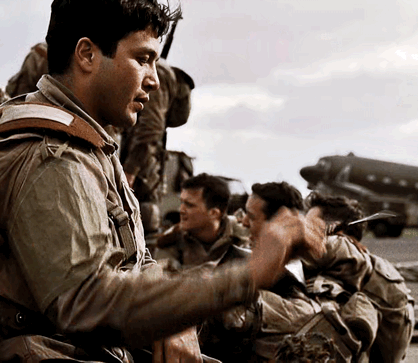
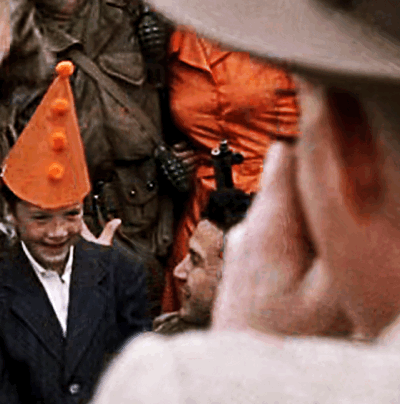
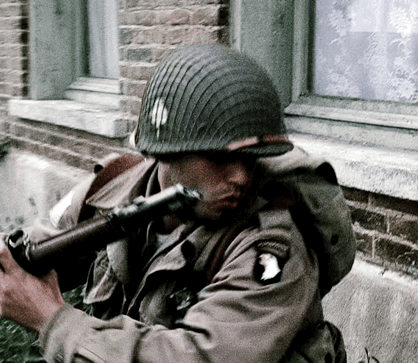
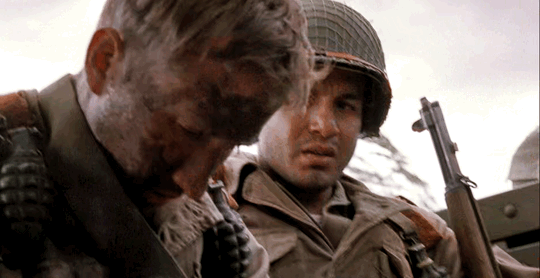
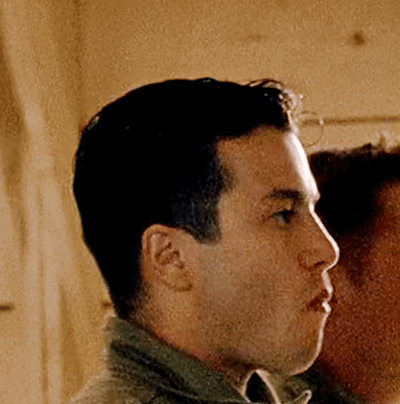


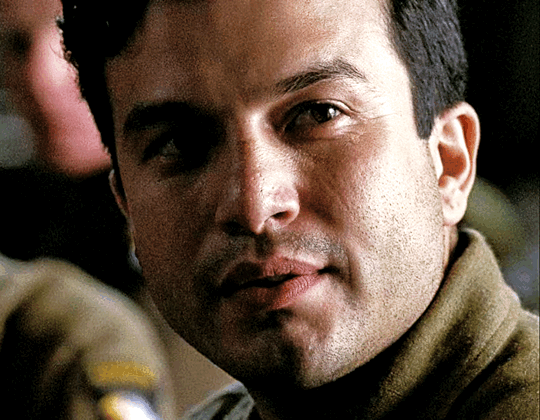
HISPANIC HERITAGE MONTH + BAND OF BROTHERS:
JOSEPH "JOE" RAMIREZ
Born October 5th, 1921, in Nebraska
Died April 8th, 1988 (age 66), in Martinez, California
Joe Ramirez enlisted in September 1942 (age 20) in San Francisco, CA, and he trained with Easy Company at Toccoa. Holding the rank of Private, he served in Normandy, Holland, and Bastogne. He was hospitalized in January 1945, and discharged in July 1945. After the war, he was married for many years, and had children and grandchildren. When he passed away he was buried with his wife, who had passed away 11 years earlier. Further information about him is scarce, but the brief character profile in the Band of Brothers series bible describes him as Mexican-American, and his personality as "sensitive and nervous."
Appears in Episodes 1, 3-8, and 10; portrayed by actor Rene L. Moreno
Sources below
A million thanks to @bleedingcoffee42 for tracking down this info for me!
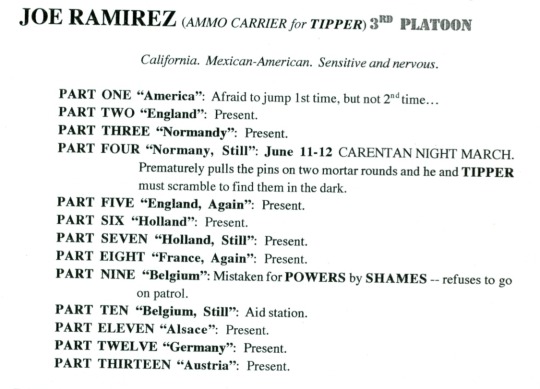

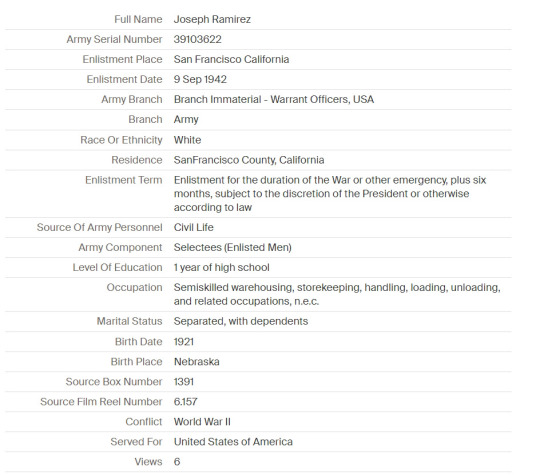
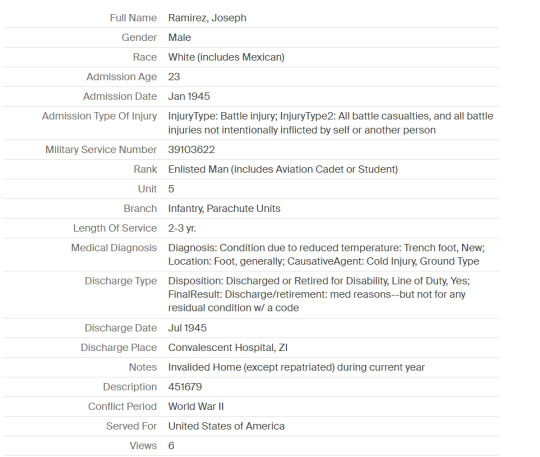
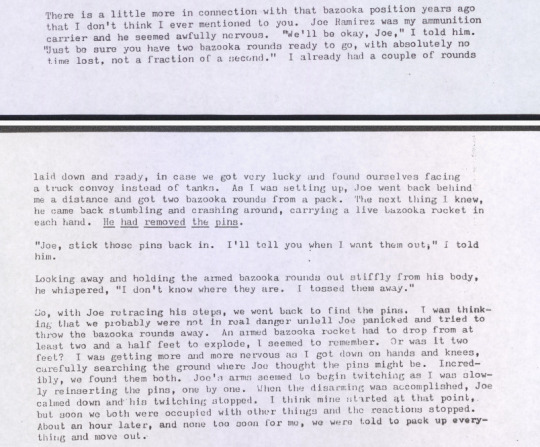
#joe ramirez#joseph ramirez#band of brothers#rene l. moreno#mine: gifs#hispanic heritage month#latino heritage month#sources vary on whether he was a Private or PFC#they seem to have taken A LOT of creative liberties on the show bc#the only 2 anecdotes about him in BoB seem pretty diff from his character on-screen#not to mention that he would've been in the hospital during events of episodes 8 and 10 (each of which he's in several scenes)#on the other hand i do really like his character in the show and think he's one of the best and most underrated background characters#and why yes i am completely normal about him 😅#but also i'm sure he would've been great too if they'd made him more accurate to what limited info exists about the IRL guy#I forgot to save a few of the documents that bleedingcoffee42 sent me unfortunately but these are most of them!#but from one of them (his draft card?) i discovered he lived like 1.5 miles from my grandparents!!#(tho of course they moved there in the 50s so who knows if he was still living at same address by then... but still!)#oops i originally had the episodes he's in listed wrong on this#so AFAIK he's only NOT in eps 2 and 9#in ep 1 he's twirling a knife at the beginning and eating spaghetti next to Guarnere and Malarkey and playing basketball in England#in ep 6 he's eating the bean soup near the line when Sink arrives#in 7 he's sitting next to popeye and then in the church at the end (maybe in Foy but i'm not positive)#in ep 3 i thiiiink he's in Carentan next to Buck? and he's at the party in England sitting next to Lipton and listening to Gordon#in 4 he's in too many scenes to list here#in 8 he's in too many to list#in 10 he's hunting for food with the group and standing next to Grant's shooter when Speirs comes in the room
109 notes
·
View notes
Text
open starter @lunarcovestarters at the hospital.
On his way home from work he'd been nabbed. Shoved in the back of an unmarked van still wearing his scrubs. They couldn't have kidnapped him before work? Or at least after he'd had a chance to change? Devrim was more annoyed about sitting in dirty scrubs than being shoved in the back of a van. It was if his kidnappers could read his mind. After they broke his leg and shot him in the knee of the other leg, Devrim was repeatedly dunked in water. He wouldn't call it as refreshing as a shower, but of the two ways he'd almost died in his life he wouldn't say drowning was the worst. Seconds before he saw Song shatter the tank's glass he almost felt peaceful.
Now all he felt was pain. The physical overshadowed by the mental anguish. A frustration for his lameness. Forced, not once but twice now, to regain his mobility. Maybe he'd be better suited as something more durable than human. If he wanted to stay in Lunar Cove.
"If you want the jello just take it."

#convos.#open#tw drowning#tw death#tw injury#tw gun shot#tw gsw#tw broken leg#tw hospital#tw dev throwing a pity party#doctors make the worst patients pass it on
62 notes
·
View notes
Text
Friendly reminder to everyone that fiction with shocking, dark, gruesome, or otherwise unpleasant content is not inherently harmful to read, write, or otherwise interact with. Lolita is one of the most disturbing books out there, and not only is it taught in most undergrad lit courses, a whole genre of under-25 girlies have made it their whole personality and blog theme.
UNFRIENDLY reminder that you do not actually have any moral right to publicly call someone out for enjoying dark and disturbing content. You do not have any ethical justification for putting someone on blast as a potential risk when you have no proof they have harmed anyone. You cannot claim that a given individual represents a danger to others when they freely and often express that their work could cause distress and should be avoided by people sensitive to it.
We call that McCarthyism in common parlance, or witch hunts if you’re feeling spicy. Neither practices have, historically, effected much in the way of justice.
#babes you need to evaluate fic with the lens of kink okay?#the author consented to write it and you give your consent to read it by…reading it#there are no living parties actually being exploited#also the things real life queers fantasize about would put coquettes in psychiatric hospitals just saying
310 notes
·
View notes